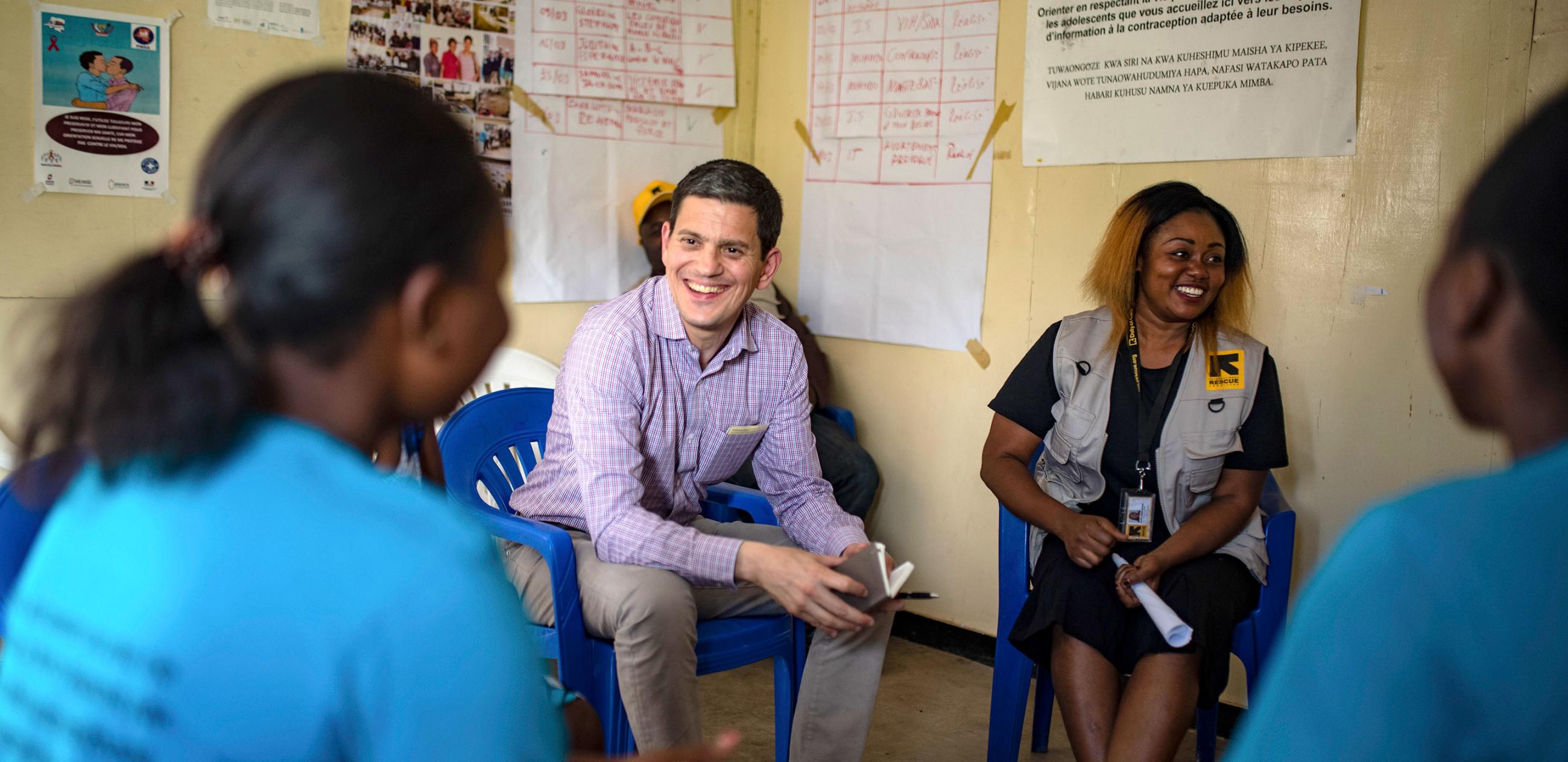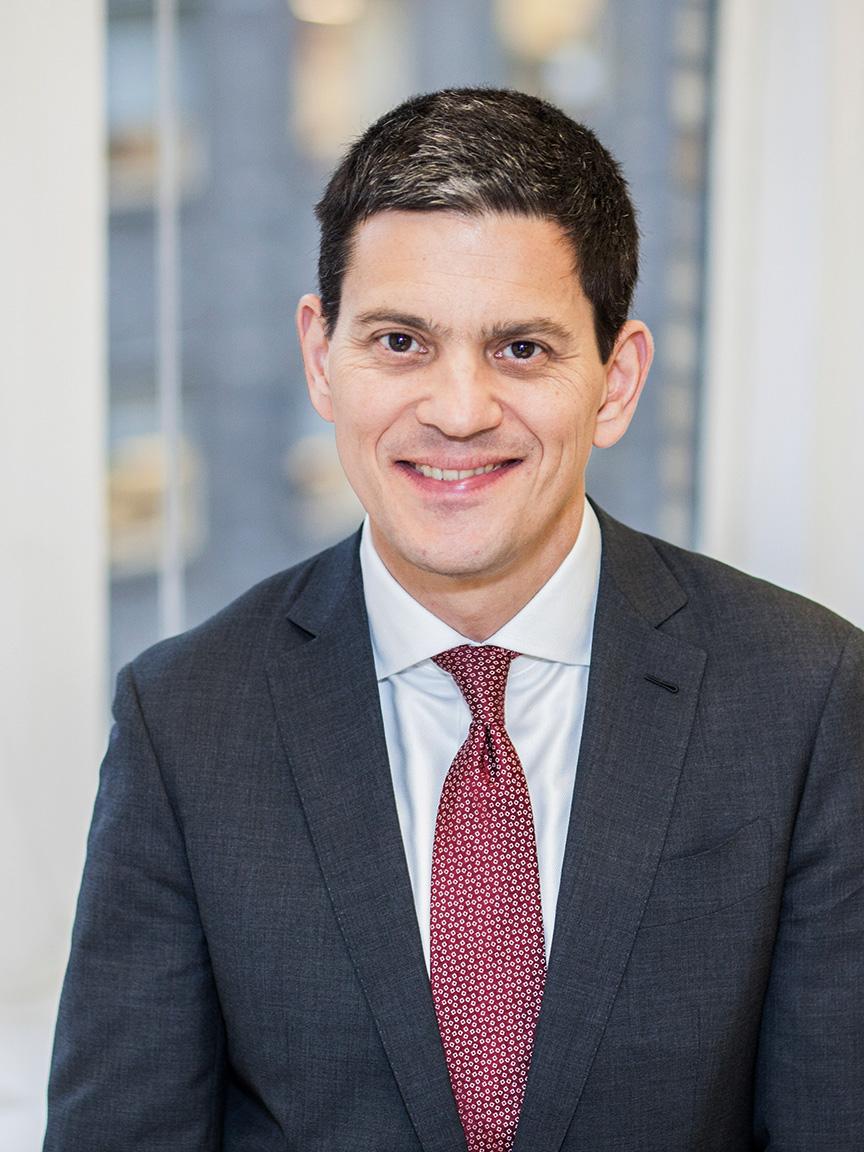The International Rescue Committee (IRC) responds to the world’s worst humanitarian crises, helping to restore health, safety, education, economic wellbeing, and power to people devastated by conflict and disaster. IRC was founded in 1933 at the call of Albert Einstein and today works in more than 45 countries. In order to get humanitarian aid to where the need is greatest, IRC takes an impact-oriented approach. Last year alone it supported more than 32 million people. GIZ has been partnering with IRC since 2015 and has since then implemented projects and research in countries such as Iraq, Turkey, Cameroon, Nigeria, Liberia, Jordan, Myanmar, Afghanistan and Colombia.

‘Internally displaced people are less visible but also in need’
David Miliband is President and CEO of the International Rescue Committee (IRC), an NGO devoted to providing lifesaving aid in serious crises. In this interview with akzente, the former British Foreign Secretary talks about humanitarian hotspots, the global refugee situation and why internally displaced people tend to be overlooked.
Mr Miliband, there are countless crises around the world. Which one troubles you the most?
The most worrisome situation for me right now is in East Africa. 30 million people there face the threat of famine and are thus in mortal danger – more than anywhere else, among them many refugees and internally displaced persons. And yet a disproportionately low level of attention is being paid to this situation.
Are we focusing too much on Ukraine?
It is completely understandable that Europeans are concentrating on Ukraine. The conflict has spread millions of refugees across Europe and poses a serious risk to the international order. But at the same time, we will undermine precisely the values we are trying to defend in Ukraine if war crimes, poverty and conflicts elsewhere are ignored. Plus, crises like the one in East Africa will end up as our problems if they are not addressed, even if they are farther away. So we have to walk and chew gum at the same time.
‘We are in the middle of a long-term trend of forced migration.’
The number of uprooted people has been rising steadily over the past decade. More than half of those are internally displaced. Why are they often overlooked in this discourse?
Refugees are more visible. They cross international borders and are regarded with fear and are demonised. Internally displaced people remain citizens of their countries. The responsibility for them lies with their own governments, but that responsibility is all too often not fulfilled. Sometimes they are even targeted as political opponents or a different ethnic group. For all these reasons they need help from the outside.
Is it difficult for you to work with internally displaced people because of their different legal status?
There is a legal difference, but it does not make it more difficult. When people flee to inaccessible parts of a country where there might even be an armed opposition group that is when it gets hard for us. There is also an important similarity between refugees and displaced people – both usually live in very poor conditions. Most refugees are not in Germany, the United States or the United Kingdom. They are in places like Bangladesh, Ethiopia, Pakistan, Uganda or Lebanon. Similarly, most internally displaced people suffer from great poverty; it is not like moving from Heidelberg to Berlin for a new job.
What are the main reasons why people leave their homes?
There are three significant causes according to our Emergency Watchlist, of which conflict is the greatest. It drives 70 per cent of humanitarian need. Second is the climate crisis; the third reason is recent economic shocks resulting from factors like COVID, interest rate rises or increased food prices.
Is it true that people like to stay as close to their home as possible because they hope to return?
Yes, people want to stay close to home, but it is also true that the first priority is to be safe. So if they are under threat from an occupying army, political prosecution or a gang, they put safety first. And if that means moving further away from home, they will.
Are we at the beginning of a new forced migration era worldwide?
There are 54 civil conflicts right now, plus the war in Ukraine. Most of them are long-term conflicts. So, yes, we are in the middle of a long-term trend of forced migration. The 2010s marked the beginning of a rising tide, not the end of it.
At the same time, it seems like solidarity is decreasing …
I do not see a backlash. There are far-right parties that want to ban refugees but there is quite a lot of solidarity as well. It is a polarised situation. Still, it is a situation to worry about because there is no room for complacency.
Where is Germany in all of this?
Germany is an admirable story of international engagement. It is a significant aid funder and a supporter of the multilateral system.
Is there anything Germany could improve?
Firstly, Germany should recognise that the most impactful outcomes are achieved with more flexible processes. That holds particularly true for fragile and conflict states. Secondly, Germany is an important supporter of the United Nations. Yet it should also see that, in some places, civil society is the better choice. So I would recommend partnering more with NGOs while staying rooted in the UN system. And thirdly, Germany should be a leader in feminist development policy. Its new strategy is still a label, a set of commitments that now have to be implemented.
Why is that important?
Aid for refugees and internally displaced people can only be effective if the needs of girls and women are thoroughly taken into account. We know that they are particularly exposed to violence and different forms of discrimination. So at IRC, we know that we cannot be a successful humanitarian agency without being feminist.
What is GIZ’s role here? How could it enhance its activities in cooperation with you?
GIZ is rooted in its commitment to technical excellence. That is important. But I would urge GIZ to sustain a high-risk appetite and recognise that the humanitarian sector has not had enough innovation. IRC has a long list of things we would like to do with GIZ, an important one being regular and strategic multi-year partnerships, engaging with us on innovative ideas to make an impact at higher scale. We would also like to use the new feminist development policy as an impetus to focus on the role of women and girls in programming together with GIZ.
You have been President of IRC for about 10 years. What drives you personally in this position?
We are helping more people than ever before, 32 million last year. And we are helping them more profoundly and more effectively than ever before. To see that we can make a real difference is what motivates me.
